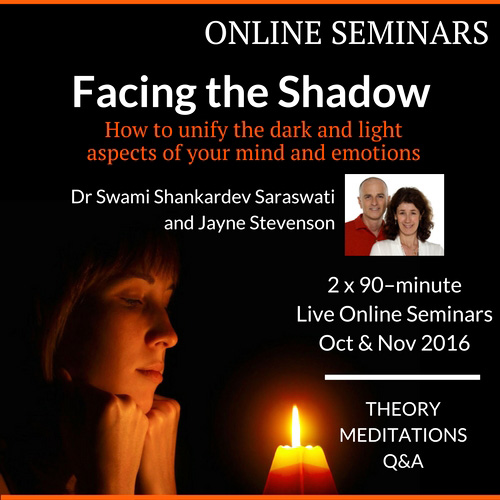This website uses cookies so that we can provide you with the best user experience possible. Cookie information is stored in your browser and performs functions such as recognising you when you return to our website and helping our team to understand which sections of the website you find most interesting and useful.
Has Your Shadow Hijacked Your Life?

Your shadow contains all the traits and impulses that you disconnect from in yourself, but which you can plainly see in other people, such as egotism, laziness, carelessness, cowardice, greed and aggression.
If you are unaware of your own shadow, or if you are aware but neglect responsibility for it, your shadow can send distressing thoughts, emotions, and impulses into your awareness, seemingly from out the blue, and can even cause accidents. You can say or do things that you would rather not say or do, and this erodes the quality of your life.
Your Shadow in Relationships
The more control your own shadow has over you, the more easily you fall prey to another person’s shadow. Relationships can be fraught, strained or stormy, and they often end suddenly and badly. This is because if your shadow is in control it causes projection and denial. You can’t see who the other person actually is because your projection is getting in the way. The greatest tragedy, however, is that you can’t see yourself.
No-one is immune to the power of the shadow and we all have one. The quest is not to get rid of it (since you never can), but to learn about its nature and impact on your life, and begin a process of reintegration of all the shadow aspects that you’ve disowned. Ultimately, you need to take responsibility for your shadow so that you stop projecting both your ‘negative’ and ‘golden’ shadow onto others. This creates psychological peace, which is essential for mature relationships.
Feelings and Behaviors from the Unconscious Shadow
An unconscious shadow can cause anything from niggling annoyances to severe psychological disorders. Here are some examples of the shadow being in control; when the suppressed shadow becomes energized and empowered.
- Feeling irritated and angry for no obvious reason
- Feeling nervous or anxious for no obvious reason
- Regurgitating a negative thought or emotion
- Thinking that life is meaningless
- Feeling apathetic or bored
- Compulsively hiding how you really feel
- Acting against your own values and ethics
- Feeling shame or guilt
- Blaming others for your problems
- Sulking
Types of Shadows: Negative, Golden, Family, Societal
Everyone carries several types of shadows, and they often overlap.
Here are some examples:
You repeatedly encounter people who share the same fault e.g. jealousy, aloofness, thoughtlessness. This is your active Negative Shadow.
You are surrounded by people who are talented in the way you wish you were e.g. they are outgoing, creative, successful. This is your active Golden Shadow.
You find that other people in your life have that same issue with you as you have with a parent. E.g. they are neurotic, domineering or neglectful. This is your active Family Shadow.
You feel that you don’t fit in with your community or culture, and strongly react to its beliefs or customs, such as religious or marriage practices, yet you maintain the status quo. This is your active Societal Shadow.
Safe, Appropriate Reintegration of the Shadow
Until you face the shadow parts of yourself and learn to reintegrate the shadow into your consciousness, you can feel like a victim at the mercy of external forces.
It is difficult to see your own shadow and begin to work with it alone. It’s important to have a guide so that you can explore your shadow safely and appropriately. ‘Safely and appropriately’ means that, rather than experiencing cathartic release of your shadow, you develop a process of gradual reintegration, managing and conquering one shadow aspect of yourself at a time.
Once you begin a process of recognition and reintegration, your personal power, stability and inner calm begin to grow. You feel a ‘coming to your senses’, as though a veil lifting from your mind. The more aware you become, the more you disempower your shadow, and this enables you to accept yourself. It’s a fascinating process that reveals new characteristics and traits, and many new desires and adventures.
Please join our Facing the Shadow Seminar Series October/November 2016 if you would like to be supported in exploring and reintegrating your shadow. You’ll have direct access to Dr Swami Shankardev and myself, Jayne Stevenson.
Swami Shankardev is a Yoga Acharya and Psychotherapist who has worked with clients for over 40 years to understand their psychological shadow. I have studied the shadow for many decades (Carl Jung, Joseph Campbell, James Hillman) and work with clients to explore their shadow through dreamwork.
Share
Latest Posts
Meditation
Yoga
Wisdom
Chakras
Get Wellbeing and Wisdom Updates
"*" indicates required fields


